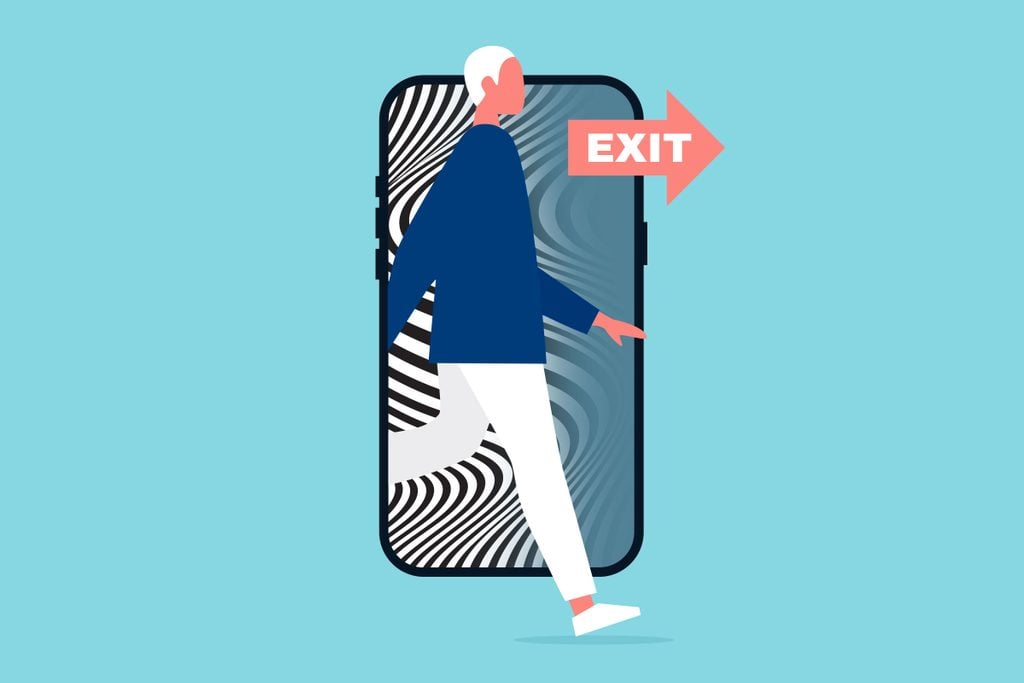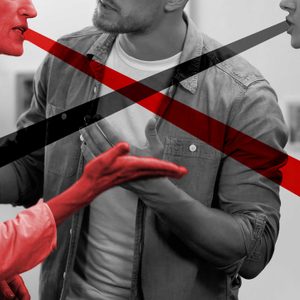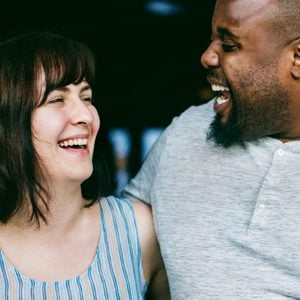This Is the Only Thing That Helped Me Stop Doomscrolling
Updated: Nov. 25, 2022

When the news is always urgent and always awful, it’s easy to get sucked in. But when it starts to adversely affect your mental health, here's how to step away.
There have been plenty of times where I’ve accidentally lost myself online. Almost everyone has been there at some point. I’ll open up Facebook to post “a quick update,” but then I’ll see a controversial story right at the top of my news feed that makes me go, “What?” I’ll read that article, then another and still another, and suddenly, hours have gone by. I’ll look up at the clock and realize that half my day is gone.
I guess I’ve become a Facebook addict. Current events turned my casual social media use into an obsession, especially over the past year. The worse 2020 got, the more I found myself doomscrolling to find out what the heck was going on and just how bad things were. I spent hours researching to discover the truth of it all so that I could share the information with others—that is, until I felt bad, physically and mentally, all the time. Then I knew I had to put the brakes on.
A foundation of wanting to know the truth
There’s always been this part of me that’s wanted to know what’s going on. I’d spend hours listening to AM radio, and I’d buy all kinds of books. With the Internet, things got more intense. I didn’t feel I was getting the whole scoop from the mainstream news, or whatever you want to call it, so I was searching for something more.
I once went to a Noam Chomsky reading, and during the Q&A, I asked him, “Where do you go for the truth?” His answer was: “Read everything.” He explained that if you really want to be informed in this information-overload age, you have to read everything because you’ll begin to notice patterns and see what everybody’s angle is. And if you want to know the truth about an event, you have to read all eight angles and then suss out the central truth between them. I wasn’t going to click on one link and think I had the truth. I was going to have to click and go down the wormhole to see how many people were talking about it and what they were saying.
So when I’d see trusted friends posting certain information, I’d follow those wormholes. Or when I would see people who’d been suspect in the past posting what appeared to be nonsense, I’d follow those wormholes, too, to find out more—there’s a lot of misinformation and red herrings out there. I’d look for the good news and the bad news, the truth and the fiction. Once I had the facts of a story, I’d look at who was behind it, who had something to gain from it, and what the endgame was.
Current events made it worse
It started getting bad for me when we entered this phase of people putting forth dangerous-for-society beliefs. Take COVID-19. If I came across a bunch of people spreading unscientific information that COVID-19 was a hoax or masks didn’t work, I felt a sense of social justice where I wanted to doomscroll, get the information, and then share what I thought was the most truthful. I wanted to do my part and fight against the misinformation hordes who could be literally damaging society.
But it really crossed the line with Black Lives Matter, where I saw videos of Black leaders and everyday citizens crying out for help. I couldn’t just pass those voices by. I felt their pain and frustration and anger and couldn’t allow others to spread lies about what was really happening. I wanted to be on the right side of history, the side that’s helping people. And I felt a certain responsibility to help humanity—not just by spreading good information but by squashing the bad information.
My breaking point
There was no big moment that made me realize I had to stop. It was more of a cumulative effect. I was feeling bad—not necessarily depressed, but having negative feelings after reading all of these “doomy” stories. After a while, there’s a physical “ick” feeling, like you’ve just been washing around in the pig trough. I also realized at one point: I’ve got a lot of life I’ve gotta start living; I’d better enjoy it. I had to step back and analyze how I was spending my time.
I’m a musician, and I started looking around at the pile of songs and staff paper and lyric bits and thinking, I could’ve just put four hours into working on my songs. Also, as a creative person, is this really what I want my creative legacy to be—the guy who worked really hard on Facebook? Or is it the guy who’s going to build a website and release an album during lockdown? It really became a conscious choice of: Where is my creative energy going, and how can it be better spent?
How I slowed my doomscrolling roll
I don’t know that there’s a magic formula, but for me, it’s really just this simple: I made a conscious decision to step away. I realized that I could take a four-hour block that I might’ve spent online and instead could walk over to my piano and become a better musician. It’s a conscious decision to figure out what I’m going to put my energy into and to do something constructive—not just constructive for my life (energetically, emotionally, and psychologically), but also better for my career as a musician and as a teacher. When you go online and spew all your energy, that never comes back. Here, with the piano and the guitar and the music, there’s a positive energy and maybe something you can show for it, like a song that might change somebody’s life.
While the decision to step away was easy, the follow-through…not so much. I’m still trying my best to stay focused on my music in general, but there’s a slippery slope once you go online. I’ve definitely decreased the doomscrolling, but I haven’t completely cut the cord. At least once a day, I open up social media. I have to be really conscious of monitoring which rabbit holes I go down, if any, and how much time I’m spending on it. The problem is, when I turn on the computer and the news is terrible, there’s no way I’m going to say, “Oh, cool,” and walk away!
But now, I’m more aware of the problem. And if I feel like there’s a chance to go off the rails, I will look at the clock, give my day a quick scan, and see what I have to do, such as creating lesson plans, marketing on my website, or walking the dog. Then I’ll set a deadline or make a deal with myself: “If you go down this wormhole and then you look at the clock and it’s such-and-such time, you have to cut yourself off. So, if there’s anything you want to read or say to someone online, you’d better do it in the next few minutes!”
Feeling better…but still feeling the pull
Things feel better. I have that one part of me that’s taking care of myself and my needs and saying, “This is much better for your life. Your health’s better, you’re feeling better, the things you need to accomplish for your legacy are better.” Then there’s the other part that’s always stood up against the bullies on the playground. There is that part of me that hears the voice asking if I’m doing enough to help society. So while I feel better, there’s still that nagging voice of wanting to do more research and wanting to be involved. I could very honestly explore how much of that is the social justice part of me and how much is the doomscroller addict. It’s a fair question.
Jason E.R. Hedrington is a music teacher, composer, and musician in Bethlehem, Pennsylvania.

